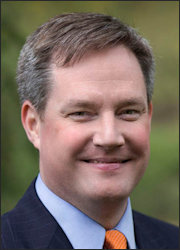
UVa spokesperson Anthony de Bruyn. Pay careful attention to what he says and how he says it.
The University of Virginia’s office of University Advancement curried favor for children of major donors by working through the office of President Teresa Sullivan rather than lobbying the admissions department directly.
That’s the big reveal in reporting by Daily Progress reporter Derek Quizon in his follow-up to the Washington Post reporting on documents showing that the University of Virginia’s fund-raising office routinely intervenes on behalf of applicants from families of potential donors.
More than 160 pages of records, uncovered by writer Jeff Thomas through a Freedom of Information Act request and given to the Washington Post, reveal dozens of instances in which the university advancement office monitored the progress of particular applicants through the admissions process.
Quizon built on the WaPo story by highlighting the fact that, rather than seeking to influence the admissions office directly, advancement officials often appealed to Sean Kirk Jenkins, a special assistant to President Teresa Sullivan. Jenkins is repeatedly referenced in the documents.
However, Quizon concludes after his review of the evidence, “It’s not clear how successful the advancement office was in these outreach efforts.”
University spokesman Anthony de Bruyn denied that the university favors the children of donors, but he conceded in communication with the Daily Progress that the advancement office does maintain contact with donors and alumni “recommending students who have an interest in attending UVa.”
De Bruyn’s statements (as quoted and paraphrased by Quizon) seem carefully wordsmithed.
“This practice allows development officers to serve as a buffer with those alumni, donors and friends who have provided prospective student endorsements during the admission cycle,” de Bruyn said. “However, the admissions office makes the independent determination on whether a student is admitted or not.”
In line with university protocol, the admissions office does not coordinate with the advancement office during the admissions process, de Bruyn said.
But the concern now isn’t that the advancement office coordinated with the admissions office, it’s that the advancement office coordinated with the president’s office and that Jenkins might have intervened with the admissions office. Quizon continues:
When asked whether the advancement office has ever successfully changed an applicant’s admission status, de Bruyn repeated that admissions officials are the only ones who determine who gets into the university.
“The advancement office does not determine whether an applicant is admitted,” he said.
Again, de Bruyn is answering Quizon’s queries very narrowly. Someone needs to ask him directly, “Does the president’s office ever seek to influence the admissions process?” Another question to ask: “Even if admissions officers have the final say on who gets in, does influence from the president’s office carry any weight?”
Bacon’s bottom line: Here’s what we know: (1) UVa donors and potential donors frequently seek special treatment for their children. (2) They enlist the help of the office of University Advancement. (3) University Advancement seeks to influence selections through the office of the President. We don’t know whether the office of the president exercises any influence on Admissions. But the FOIA documents and UVa’s careful response to questions fuel our suspicions.
Nothing de Bruyn said contradicts the hypothesis that Jenkins intervened on behalf of University Advancement, and it’s difficult to understand why advancement officials would have repeatedly worked through Jenkins unless they thought that he might be able to help them. But there is no proof. We cannot rule out the possibility that, in contravention of our cynical expectations, Jenkins never lifted a finger for the favor seekers.
Reporters covering this story should focus on the Jenkins connection. Thomas’ original Freedom of Information Act request was limited to the advancement office. Someone needs to expand the FOIA request to obtain Jenkins‘ communications with the admissions office.
At the same time, we need to be careful what we make of this favoritism, if in fact it occurs. As I mentioned in my previous post on this topic, we may be talking relatively small numbers — only 59 children of potential donors were mentioned in the FOIA documents. The actual number might have been larger — we don’t know for sure. But the number given preferential treatment, if indeed such treatment can be documented, could be much smaller. If a couple dozen of the roughly 10,000 students admitted to UVa this year benefited from favoritism, this is not a massive scandal. Yes, it strips away the veneer that UVa admits all students on a purely meritocratic basis (leavened by aggressive recruitment of minorities). That would put it in the same camp as every other university in the country. If there is a scandal, it is national in scope, and we have no way of no way of knowing whether UVa’s (alleged) sins are more or less egregious than those of any other institution.


